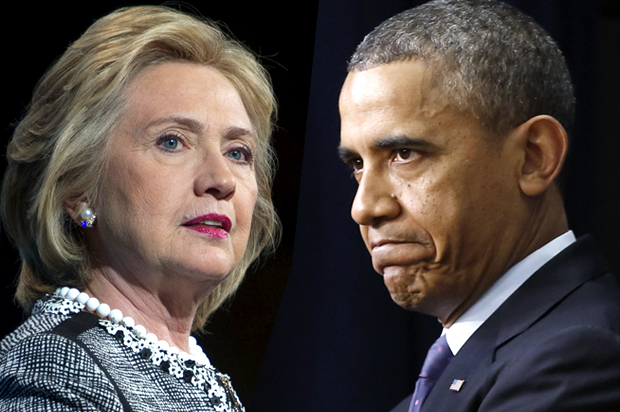The Atlantic’s Jeffrey Goldberg has another long interview with President Obama out Thursday. Goldberg’s much more of a hawk than I am; so, unsurprisingly, he spends a lot more time asking Obama to defend his foreign policy against its usual hawkish critics than I’d like. But the interview is a good read nevertheless, and it offers new insight as to how Obama understands his legacy and the state of the world. You should read it.
There’s one part of the interview in particular, however, that I think deserves special attention. Not because it’s necessarily more interesting than the rest of the piece, but because of what it suggests about how Hillary Clinton will operate if she’s elected as Obama’s successor and becomes commander-in-chief. If you’re a dove who’s hoping Clinton will follow Obama’s “don’t do stupid shit” doctrine, get ready to be disappointed.
It’s when Goldberg and the president start talking about one of the latter’s most widely criticized moves — his decision not to follow up on his threat to attack the Assad regime in Syria if it crossed the “red line” and deployed chemical weapons — that the differences between Obama’s worldview and the conventional wisdom become most obvious. Most “serious” foreign policy wonks regard that as one of Obama’s biggest mistakes; he tells Goldberg he sees it as one of his proudest moments.
Why is he proud? Because this moment, he says, is when he most fully broke from what he sees as the rigid and often self-destructive foreign policy “playbook” that is so hegemonic in Washington:
“Where am I controversial? When it comes to the use of military power,” he said. “That is the source of the controversy. There’s a playbook in Washington that presidents are supposed to follow. It’s a playbook that comes out of the foreign-policy establishment. And the playbook prescribes responses to different events, and these responses tend to be militarized responses. Where America is directly threatened, the playbook works. But the playbook can also be a trap that can lead to bad decisions. In the midst of an international challenge like Syria, you get judged harshly if you don’t follow the playbook, even if there are good reasons why it does not apply.”
Elsewhere in the piece, Goldberg reports Obama telling his White House staff that “dropping bombs on someone to prove that you’re willing to drop bombs on someone is just about the worst reason to use force.” The conventional wisdom says that the decision not to bomb hurt America’s “credibility.” Goldberg writes that Obama is skeptical that such a thing exists, much less that it’s worth going to war to protect.
Hillary Clinton disagrees. Or at least that’s what Goldberg reports (my emphasis):
For some foreign-policy experts, even within his own administration, Obama’s about-face on enforcing the red line was a dispiriting moment in which he displayed irresolution and naïveté, and did lasting damage to America’s standing in the world. “Once the commander in chief draws that red line,” Leon Panetta, who served as CIA director and then as secretary of defense in Obama’s first term, told me recently, “then I think the credibility of the commander in chief and this nation is at stake if he doesn’t enforce it.” Right after Obama’s reversal, Hillary Clinton said privately, “If you say you’re going to strike, you have to strike. There’s no choice.”
Now, this was reportedly something Clinton said in “private,” and it was her initial response to something that happened nearly three years ago, too. She may have changed her mind in the time since. She also may have been saying that, politically, once a president has laid down the gauntlet, there’s no going back. I don’t want to suggest that we should regard this quote as a de facto “Clinton doctrine.”
All that being said, though, the mere possibility that a President Clinton would unleash deadly force not because she thinks it’s the right thing to do on the merits, but because she believes she — the commander-in-chief — has “no choice” … Well, to describe it as a cause for concern would be to put it lightly. We’ve had presidents use the military for ego-driven and selfish reasons before. The result is usually disastrous.
This isn’t the only sign that Clinton resists changing her mind in the face of new circumstances, either. According to a recent, must-read two-part report on the role Clinton played in the decision to intervene in Libya’s civil war, even as Clinton watched mission creep turn a humanitarian intervention into regime change, her commitment to the mission never wavered. From part one of the Times report (emphasis mine):
The incremental escalation ran against Mr. Obama’s instincts, and he did it reluctantly, said Mr. Ross, the former National Security Council official. Mrs. Clinton, he said, was less concerned that “every step puts you on a slippery slope.”
“Her view is, we can’t fail in this,” Mr. Ross said. “Once we have made a decision, we can’t fail.”
From the perspective of those who think U.S. foreign policy is already too militarized and hubristic, the Obama years, for all their flaws, have been a welcome respite from the “bomb-first-and-ask-questions-later” Washington consensus. At times, it’s felt that the only thing keeping the country from getting sucked back into another ruinous, full-scale military operation in the Middle East has been the will of the president.
Unfortunately, it looks like that interregnum may be about to end — regardless of who wins this year’s presidential election.

